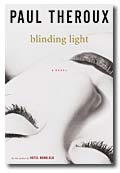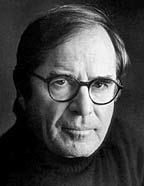
|
 Honolulu Lite. Extra.
|
Life joins
art of darkness
WHEN dealing with the life and works of writer Paul Theroux, you don't know if life is imitating art, art is imitating life, life is imitating life or art is imitating art. But you know that something weird is going on.
Synopsis: Slade Steadman is the ultimate one-book wonder. His lone opus, published 20 years ago, was "Trespassing," a cult classic about his travels through dozens of countries without a passport. Now he sets out to the jungles of Ecuador to find a rare hallucinogenic drug to cure his writer's block.
With the drug he finds inspiration but also an unnerving side effect -- blindness. Not a darkened blindness, but one of heightened senses and seeming telepathy. His new book is a success but addiction to the jungle concoction renders him actually blind. Will he regain his vision and visions or was the cure worse than the affliction?
|
As I am about to inflict myself on Theroux, I notice more weirdness and irony can be found in the press packet about his new book. It includes a biographical review HE did of novelist Graham Greene in which Theroux writes, "Until about 30 years ago writers ... were not at all accessible to the reading public; they did not turn up for signings at bookstores or allow themselves to be pimped by publicists."
Mind you, that observation was included IN the material his pimps were using to publicize his new book.
Theroux (his name is pronounced "Thor-ew" not like the dude from Walden Pond) lives on Oahu's North Shore. I was willing to travel the mere 12 miles to meet with the man whose travel writing has taken him literally millions of miles around the world, but he was about to pop off to India so we had to conduct our discussion by telephone. You can't imagine how much fun it is to prepare to interview someone who recently complained of the "age of intrusion where publishers conspire with bookstores to bully writers into the open and make them part of the selling mechanism."
Actually, I was the one who bullied Theroux into talking to me, and his pimp, I mean, publisher just went along. I was relieved to discover that the Paul Theroux on the other end of the phone wasn't the cranky-looking figure portrayed in his Official Author Book Jacket Photo. He's a guy who, after traveling the globe several times over, figured out that Hawaii is the best place to live. At least most of time. He also spends time in Cape Cod, which I think is mandatory for a writer of his stature.
"Hawaii is the best archipelago in the Pacific in terms of being a pleasant place to live, interesting people and natural beauty," he said.
He knows something about the Pacific, having visited and paddled his collapsible kayak in every island group from the Solomons to Vanuatu to the Fijis while writing "The Happy Isles of Oceania." But Hawaii isn't just another pretty face.
"Of all the places I've lived in my life, Hawaii is the most difficult to understand and takes the longest to study," he said. "And it still remains elusive."
He was careful not to write about Hawaii until he had a grasp of the various cultures and conflicting lifestyles. That took 10 years but the result was the novel "Hotel Honolulu" in which he nails -- NAILS -- pidgin better than any haole writer who never went to public school here.
He's struck by our state's many ironies, like the fact that a Kailua public school was sending money to a school in Zambia out of humanitarian concern.
"The Zambian Ministry of Education has plenty of money," he said. "They just don't spend it on schools."
He tried to visit that particular Zambian school on his "Dark Star" safari but couldn't find it. His trip down the eastern side of Africa took him back to where he had been a Peace Corps teacher in a bush school in Malawi and a lecturer at Uganda's Makerere University. He was disturbed to find out that after decades of foreign help by religious groups, schools and world aid organizations, conditions in the African countryside remain abysmal. Offering aid might make individuals feel good, but it's turned entire countries into "basket cases" and "welfare scroungers" unable to function on their own.
It's that kind of blunt language that endears him to so many readers. In his "travel writing" (a term he dislikes), his politically incorrect assessments of people and places is, frankly, refreshing.
Here are a few observations from his books:
» "A car in Honolulu is the badge of one's class. In such a hot city, where nearly everyone rich and poor dresses identically, clothes cannot possibly be a status symbol."
» "I could never keep a straight face when I heard one of the leathery diggers (outback Australians) turn sententious over the drinking habits of Aborigines, for whom they themselves were the alcoholic role models."
» "Loud laughter was the Fijian way of conveying the bad news that something was impossible."
» I liked hearing stories of Polynesian seasickness. It was like discovering people you had always regarded as cannibals to be vegetarians."
And his many books, both novels and travel, clearly could carry the load of describing both the creation and the creator. Because in a weird way, they exist together.
E-mail to City Desk
[News] [Business] [Features] [Sports] [Editorial] [Do It Electric!]
[Classified Ads] [Search] [Subscribe] [Info] [Letter to Editor]
[Feedback]


